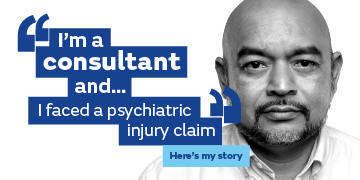Case study: Responding to a complaint from a patient
Post date: 15/02/2023 | Time to read article: 3 minsThe information within this article was correct at the time of publishing. Last updated 28/06/2023
Consultant renal physician Dr Georgia Salisbury* is asked to make a statement when a patient’s care is questioned – she calls Medical Protection for help.
Dr Salisbury contacted Medical Protection for advice when her clinical lead informed her of a patient complaint sent following a lengthy inpatient admission. As the complaint letter named several members of staff, the Trust’s complaints handling team decided to co-ordinate the overall response. Dr Salisbury was asked for a statement setting out details of her involvement in the case and her response to any concerns relating to her.
After Dr Salisbury emailed us we immediately got in touch to discuss things further.
What had happened?
Dr Salisbury acknowledged that there had been a delay in arranging appropriate imaging and initiating treatment, although these issues had largely occurred prior to her taking over the patient’s care.
She was particularly upset to learn that the patient felt her communication style was abrupt and unclear, and that the patient had failed to complete a course of antibiotics on discharge as a result. She wanted to know how best to address these concerns in her statement.
How Medical Protection helped
The case manager at Medical Protection provided advice on how to structure the response. She reassured Dr Salisbury that it was ok to include an apology to the patient at the start of any response, and that an apology is not, in itself, an admission of liability.
She discussed possible wording (for example: “I am sorry to learn that you felt I was abrupt when talking with you. This was not my intention and I would like to apologise for any distress caused”) and suggested that Dr Salisbury look into relevant CPD, focusing particularly on communication; we reminded her of Medical Protection’s online learning platform, which contains relevant modules.
The case manager also reminded Dr Salisbury that she would need to discuss the complaint at her next appraisal and suggested that she may find it useful to collate patient feedback and reflect on this in advance. Dr Salisbury confirmed that the clinical issues would be discussed at the next governance meeting, and she said that she would complete any CPD relevant to these as well. She had already had initial discussions with the team regarding written instructions for patients on discharge.
Medical Protection’s expert case manager reviewed Dr Salisbury’s draft response ahead of its submission, and also reviewed the overall Trust response prior to it being sent out.
How did it end?
The matter was resolved at the local level, and Dr Salisbury had a supportive conversation with her appraiser.
Take aways
The Local Authority Social Services and National Health Service Complaints (England) Regulations 2009 place an obligation on NHS bodies to have appropriate arrangements in place for dealing with patient complaints. NHS Trusts will usually have a designated Complaints Handling team, although complaints may also be handled by the relevant clinical team.
The complaint response process should aim to answer all concerns and identify and address any learning or action points. This approach helps to achieve resolution of the matter at the local level. Poor complaints handling can increase the risk of a matter ending up with the Ombudsman or the GMC and may increase the chance of a claim being made.
It should be borne in mind that all doctors have a duty of candour, and must be open and honest when things go wrong (although it is entirely reasonable to note that appropriate care was provided if this is the case).
In responding to a complaint, it is helpful to adopt an open and conciliatory tone, and to demonstrate that appropriate steps were taken to investigate the concerns raised. It is generally advisable to begin any complaint response with an apology: an apology is not an admission of liability, but is something that complainants will expect to receive. An apology can be broad (for example: “I realise that this must have been a difficult time for you, and I apologise if I have added to your distress in any way”), but if a specific issue or error has been identified then a more focused apology may be indicated.
After the initial apology, it can be helpful to list the concerns raised and the steps taken to investigate them. These may include reviewing the medical records, speaking with those involved, holding an SI meeting, and reading relevant guidelines and policies. A summary of events should follow, before the concerns are then addressed in turn.
Complainants are often seeking reassurance that a particular incident will not be repeated. It can therefore be helpful to include a section dealing with reflection and learning (such as any CPD undertaken because of the complaint). The overall complaint response should include information regarding the complainant’s right to take the matter to the Ombudsman, and direct the complainant to sources of complaint support (such as PALS).
Unfortunately, complaints are an almost inevitable part of a career in medicine, and they can be both distressing and time-consuming for the clinicians involved. It is important to acknowledge the impact that a complaint can have on your wellbeing. If you are facing a similar issue, try to discuss the matter with trusted colleagues and make use of any support on offer.
Medical Protection offers a free, confidential counselling service to its members, find out how to access our wellbeing resources here.
By Dr Lucy Hanington, Medicolegal Consultant at Medical Protection
Not a member already? Click here to join.
*Names and locations have been changed to protect member confidentiality.


